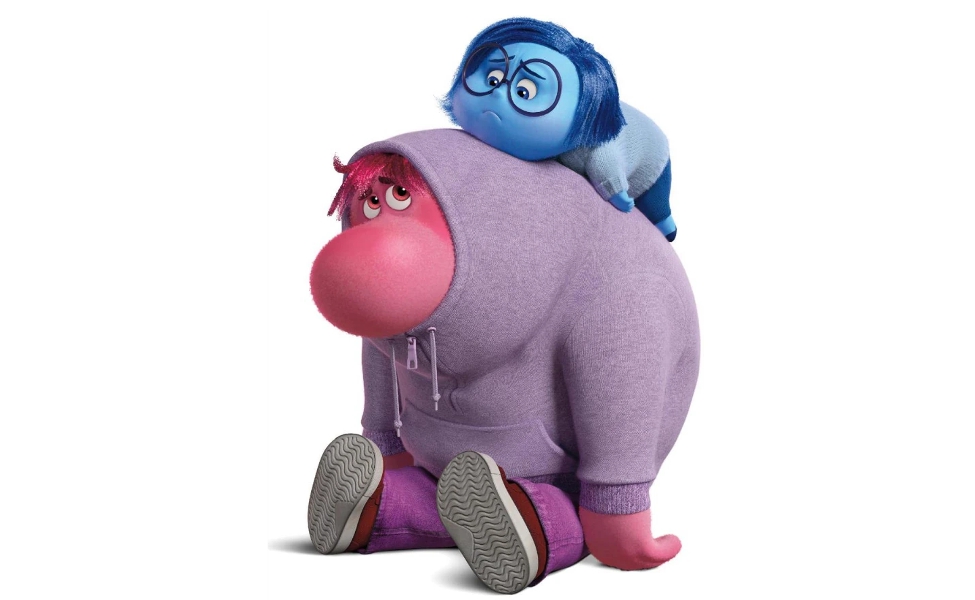Hey there, friend. You ever feel like life’s got this weird way of throwing awkward moments at you when you least expect them? Like, one second you're just walking down the street feeling cool, and the next you trip over a crack in the sidewalk, dropping your coffee all over your favorite shirt. That's what we're diving into today—embarrassment inside out 2, the sequel to those cringeworthy, unforgettable moments that make us question our existence. So grab a snack, get comfy, and let's talk about why we all have a story or two (or ten) that make us want to hide under the covers.
Embarrassment—it’s one of those universal feelings that connects us all. Whether you're a CEO running a Fortune 500 company or a barista pulling the perfect shot of espresso, we’ve all been there. That moment when you accidentally call your boss by the wrong name or forget your lines during an important presentation. It's those little hiccups in life that remind us we're human. But here's the thing: embarrassment doesn't have to be the end of the world. In fact, it can be the start of something beautiful—a lesson learned, a funny story to tell, or even a chance to connect with others.
So, why are we diving into embarrassment inside out 2? Because it's not just about the awkward moments; it's about understanding why they happen, how they affect us, and most importantly, how we can turn them into opportunities for growth. Let's break it down, shall we? Here's what we'll cover:
Read also:Kaitlyn Krems Onlyfans A Deep Dive Into Her Rise And Influence
Table of Contents
- What is Embarrassment?
- The Psychology Behind Embarrassment
- Common Causes of Embarrassment
- How to Handle Embarrassment
- Embarrassment in Different Cultures
- Famous Awkward Moments in History
- The Impact of Embarrassment on Relationships
- Turning Embarrassment Into Strength
- Embracing Your Awkward Self
- Conclusion: Laughing at Yourself
What is Embarrassment?
Alright, let's start with the basics. Embarrassment is that feeling you get when you realize you've done something that makes you feel self-conscious or uncomfortable. It's like that moment when you walk into a room and everyone suddenly goes silent, and you're left standing there wondering if you accidentally walked into the wrong meeting or if you have spinach stuck in your teeth.
But here's the thing: embarrassment isn't just about tripping in public or saying something awkward. It's a complex emotion that can stem from a variety of situations. Sometimes it's about social norms, like when you accidentally burp in a quiet library. Other times, it's about personal expectations, like when you mess up a big project at work. And let's not forget those moments when you're just being yourself, and someone else reacts in a way that makes you feel like you're the only one who doesn't get the joke.
Embarrassment Inside Out: The Emotional Rollercoaster
Embarrassment can feel like an emotional rollercoaster. One minute you're feeling confident, and the next you're questioning everything about yourself. It's that split second when you realize you've done something that might make others think less of you. But guess what? Everyone feels this way at some point. Even the most confident people have their moments of doubt and awkwardness.
The Psychology Behind Embarrassment
Now, let's dive a little deeper into the psychology of embarrassment. Why do we feel this way? Well, it all comes down to our need to be accepted by others. As social creatures, we crave connection and belonging. When we do something that makes us feel like we're standing out in a negative way, our brain goes into overdrive, trying to protect us from rejection.
Research shows that embarrassment is closely linked to self-awareness. When we become hyper-aware of our actions and how others might perceive them, we're more likely to feel embarrassed. It's like having a spotlight on you, and suddenly every little thing you do feels magnified. But here's the kicker: most of the time, others aren't even paying as much attention as we think they are. They're too busy worrying about themselves and their own awkward moments.
Embarrassment Inside Out: The Brain's Role
Our brain plays a big role in how we experience embarrassment. The amygdala, which is responsible for processing emotions, kicks into high gear when we feel embarrassed. It's like an alarm system that goes off, telling us to be cautious and avoid situations that might lead to further embarrassment. But sometimes, this alarm system can be a little too sensitive, causing us to feel embarrassed even when there's no real threat to our social standing.
Read also:Forever Was A Lie Chinese Drama A Captivating Journey Through Love And Betrayal
Common Causes of Embarrassment
So, what are some of the most common causes of embarrassment? Let's break it down:
- Social Mistakes: Tripping in public, saying the wrong name, or forgetting an important detail during a conversation.
- Physical Appearance: Spilling coffee on your shirt, having food stuck in your teeth, or walking out of the house with mismatched shoes.
- Performance Anxiety: Messing up a presentation, forgetting your lines in a play, or bombing a job interview.
- Personal Flaws: Feeling self-conscious about your weight, height, or other physical attributes.
- Cultural Norms: Breaking social rules or traditions, like burping in a quiet space or wearing the wrong attire to a formal event.
These are just a few examples, but the truth is, embarrassment can come from anywhere. It's those unexpected moments that catch us off guard and leave us feeling like we're the only ones who could possibly screw up in such a way.
Embarrassment Inside Out: The Unexpected Moments
Sometimes, the most embarrassing moments are the ones we never see coming. Like that time you thought you were waving at a friend, only to realize they were on the other side of the street, and now you're awkwardly waving at a stranger. Or when you try to impress someone with your knowledge, only to realize you've completely mispronounced a word. These moments are the ones that stick with us, replaying in our minds long after they've happened.
How to Handle Embarrassment
So, how do we handle embarrassment? First off, it's important to remember that it's a completely normal emotion. Everyone experiences it, even those people who seem to have it all together. Here are a few tips to help you navigate those awkward moments:
- Take a Deep Breath: When you feel yourself getting flustered, take a deep breath and remind yourself that it's okay to make mistakes.
- Laugh It Off: Sometimes the best way to handle embarrassment is to laugh at yourself. Chances are, the situation isn't as bad as it seems.
- Reframe the Situation: Instead of focusing on what went wrong, try to find the positive in the situation. Maybe you made someone else laugh, or maybe you learned something new.
- Talk About It: Sharing your embarrassing moments with others can be a great way to connect. Chances are, they've been in a similar situation and can relate.
Embarrassment Inside Out: The Art of Moving On
Moving on from embarrassing moments isn't always easy, but it's an important skill to develop. The more you practice letting go of those awkward feelings, the better you'll become at handling them in the future. It's all about building resilience and learning to see embarrassment as a stepping stone rather than a roadblock.
Embarrassment in Different Cultures
Did you know that embarrassment can vary depending on where you're from? In some cultures, embarrassment is seen as a sign of humility and respect for others. In others, it's viewed as a weakness that should be avoided at all costs. Let's take a look at how different cultures approach embarrassment:
- Japan: In Japanese culture, saving face is incredibly important. Embarrassment is often seen as a way to maintain harmony and avoid conflict.
- United States: Americans tend to be more open about their embarrassing moments, often using humor to diffuse awkward situations.
- India: In Indian culture, embarrassment is often tied to family honor and respect for elders. Public displays of embarrassment are generally avoided.
Understanding how different cultures view embarrassment can help us become more empathetic and understanding of others' experiences.
Embarrassment Inside Out: Cultural Differences
These cultural differences highlight the complexity of embarrassment and how it can vary depending on where you're from. What might be considered embarrassing in one culture could be seen as perfectly normal in another. It's all about perspective and learning to appreciate the diversity of human experiences.
Famous Awkward Moments in History
Even the most famous people have their embarrassing moments. Let's take a look at a few examples:
- Bill Clinton: Remember that time he accidentally played the saxophone on national TV? Yeah, that was awkward.
- Justin Timberlake: His infamous "wardrobe malfunction" with Janet Jackson during the 2004 Super Bowl halftime show will go down in history as one of the most awkward moments ever.
- Steve Jobs: Even the tech genius had his moments, like when the iPhone 4's antenna issues caused a major PR headache for Apple.
These moments remind us that even the most successful people are human too. They make mistakes, and they learn from them.
Embarrassment Inside Out: Lessons from the Stars
What can we learn from these famous embarrassing moments? For one, it's that no one is perfect. Even the people we look up to have their awkward moments. But instead of letting embarrassment define them, they use it as a learning experience and move on.
The Impact of Embarrassment on Relationships
Embarrassment can have a big impact on our relationships. Whether it's with friends, family, or romantic partners, those awkward moments can sometimes create barriers between us. But here's the thing: sharing your embarrassing moments with someone can actually strengthen your bond. It shows vulnerability and trust, two key components of any healthy relationship.
Embarrassment Inside Out: Building Connection
When we share our embarrassing moments with others, we open ourselves up to deeper connections. It's like saying, "Hey, I'm not perfect, and that's okay." This kind of vulnerability can lead to stronger, more meaningful relationships.
Turning Embarrassment Into Strength
So, how do we turn embarrassment into strength? It all comes down to mindset. Instead of seeing embarrassing moments as failures, try to see them as opportunities for growth. Every time you mess up, you're learning something new about yourself. And every time you share an embarrassing story, you're building resilience and confidence.
Embarrassment Inside Out: Building Resilience
Building resilience is all about learning to bounce back from setbacks. When you embrace your embarrassing moments and use them as learning experiences, you're building a stronger, more confident version of yourself.
Embracing Your Awkward Self
At the end of the day, it's all about embracing your awkward self. We're all human, and we all make mistakes. The more you can accept and even celebrate your embarrassing moments, the more you'll be able to live authentically and confidently.
Conclusion: Laughing at Yourself
So there you have it, folks. Embarrassment inside out 2 isn't just about those awkward moments; it's about understanding why they happen, how they affect us, and how we can turn them into opportunities for growth. Remember, everyone


